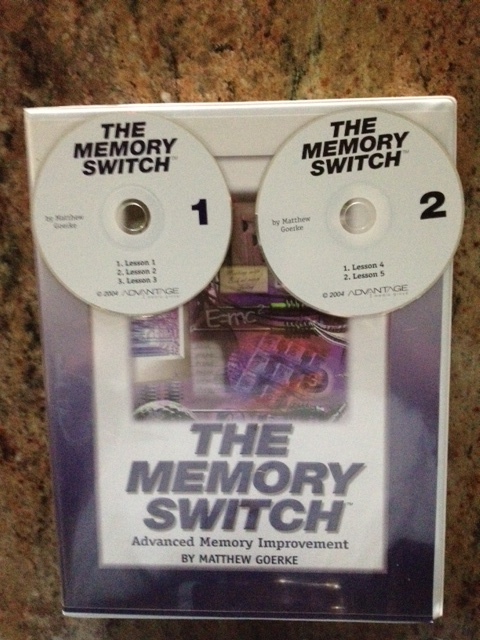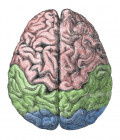A Photographic Memory - Don't Have One? Develop One
Where did I leave my wallet?

You Can Train Yourself With Memory Techniques
This article is not about neuroscience or the biology of the brain, interesting subjects to be sure, but they won't help you to find your car keys. A photographic memory, often called eidetic imagery (although that's not entirely accurate) is a wonderful talent to be blessed with. You don't waste time trying to remember names, events or where you left something. These things are just there in your brain, ready to be pulled up in an instant. Some dispute whether there is such a thing as a photographic memory, calling it a myth. But let's not split hairs; we all know people who have great memories, whether you call it photographic or eidetic or whatever. They are able to recall things that most of us mortals have long forgotten. This is cool, and it's accessible to all of us. It's all about the use of mnemonic devices, memory techniques. Improving your memory will also save you a lot of time.
The Man Who Became a Memory Athlete
Journalist Joshua Foer wrote an article in the New York Times entitled "Secrets of a Mind Gamer: How I Trained My Brain and Became a World-Class Memory Athlete." (February 15, 2011). His journey began as a reporter's assignment to research the topic about people with great memories who compete in memory events. As a good investigative reporter, Foer decided that he would go through memory technique training to find out what this was all about. Dial forward a year and there is Foer sitting as a finalist in the U.S.A. Memory Championship. In front of him were two decks of shuffled playing cards. A judge was about to hit a stopwatch and Foer and his fellow competitors would have five minutes to memorize the order of the cards in both decks. FIVE MINUTES. I won't keep you in suspense: Joshua Foer became the new champion and record holder in the event called speed cards. So adept at practicing the subject of his research, Foer penned a best selling book entitled Moonwalking With Einstein: The Art and Science of Remembering Everything. the Penguin Group, 2012.
Do you use mnemonic devices to remember things?
Mnemonics and Spatial Relationships - The Memory Palace
Are these people unusual? Are their brains wired differently than the rest of us? Apparently not. In 2003, the journal Nature did a study of these memory athletes and found that their brains were no different than those in a control group. But the study did come up with one fascinating difference. When one of these memory athletes was busy focusing on remembering something, the part of the brain that was most active was the part used for spatial memory. That's right, spatial, and that holds the clue to what mnemonics is all about.
Foer traces the whole idea of remembering things based on spatial imagery back to a tragedy that occurred in ancient Greece in the fifth century B.C. A poet, Simonides, was at an event at a banquet hall when the roof collapsed. He was the only survivor. When he was asked about who was at the banquet Simonides, to his own surprise, discovered that he was able to name each and every person at the event just by remembering where they were seated. This was the beginning, according to Foer, of the art of memory. Simonides figured that people could recall enormous amounts of information just by constructing imaginary buildings and filling them with mental pictures of things to remember. These mental buildings would become known as "memory palaces."
Centuries after the Simonides experience, a textbook was published called “Rhetorica ad Herennium.” It was penned between 86 and 82 B.C. According to Champ Foer, this book is a thoroughgoing analysis of the memory techniques that Simonides discovered. The methodologies in the book were widely taught as a basic part of education not only in the ancient world but in the Middle Ages as well. This was way before Guttenberg and the printing press, meaning that there were not a lot of books. Memory, therefore, became a critical part of a person's intellectual arsenal and was recognized as such. This was a world before Google, Spellchecker and your contacts list. This was a world where you had to remember a lot of things because you couldn't easily look them up, either in a book or on a smart phone. Centuries ago, If you read a book, you better remember what was in it because you may never see the book again.

The Man Who Picked Me Out of a Crowd - And Boggled my Mind
I had a personal experience with a master of memory techniques a few years ago at a Rotary convention. There were about 250 of us milling about a hallway on a coffee break before the next meeting session. The session was entitled "How to Improve Your memory," or something like that, so we were all anxious to attend. I was introduced to the speaker, a guy named Matthew Goerke. A pleasant chap, he asked if I had come a long distance to the meeting in Saratoga, New York. Yes, I told him, I hailed from Long Island, a few hours away. He asked if I had any kids and I told him only one son, Russ, Jr., an adult, and two wonderful grandchildren, Aidan and Kevin. He then asked if I was working on any projects, and I mentioned that I was writing a book. I figured that all of this was just polite bagel munching banter, an elongated version of the famous New York question "Haya Doin," wherein the questioner really doesn't care how I'm doing, he's just being polite.
The meeting started and Goerke was introduced. He began by talking to specific people in the audience, including me. I was seated toward the back of the hall, about 150 feet from Goerke. He pointed to me and said: "Hi Russ. How's that book coming along (he even mentioned the title). I bet you're looking forward to getting back to Long Island to see Russ Jr. and your grandkids Aidan and Kevin." Wow, I only spoke to this guy for about three minutes. He then went on to single out people in the audience and asked about the most minute details he recalled from his brief conversations with them.
Matthew Goerke is a classic expert in mnemonics. His lecture consisted of taking us through a memory palace and populating those palaces with things to remember. One of his favorites is a firehouse. He asked us to picture a fireman. He wears a hat, a rubber coat and boots. He holds an axe. He slides down a pole, and then gets into a fire truck that has a ladder and a bell on it. Before the truck pulls out he has to open the doors. All of these are pretty vivid and easy to remember because, as Simonides discovered millennia ago, they are visual and spatial mental pictures. We then made a shopping list, in the order of the fireman's dress and surroundings. Goerke urged us to follow a basic tenet of the art of memory. Come up with crazy, vivid images, ones that are easy to recall because they're so odd. First on the list were apples, so I pictured his hat balancing a bunch of fruit filled bags. He was walking slowly so as not to drop them. Next was eggs. I pictured a gigantic egg splattered all over the fireman's coat. You get the picture, not to pun. This is powerful stuff and amazed all of us because we were actually able to remember things based on the vivid images we created.
As a smart speaker, he had a bunch of his DVD courses for sale at the back of the room. It's called The Memory Switch, a modern version of “Rhetorica ad Herennium.” There was a long line, in which I stood, to buy his course. I still use it, years later.
60 Minutes Segment on Memory
A Specific Type of Memory Skill -You Either Have It or You Don't
Highly Superior Autobiographical Memory (HSAM) is a gift that only about six people in the world have been discovered to possess. The actress Marilu Henner is one of them. She was interviewed, along with others, by Leslie Stahl on CBS 60 Minutes in December 2010 (see video clip to the left). It was one of the most, well, memorable segments I have ever seen. A person with HSAM has the ability to recall every day of their lives. Ask Ms. Henner what happened on April 3, 1975, and she will tell you what day of the week it was and almost every detail about what went on that day. She can look at a shoe and tell you the exact date she bought, where she found it and how much it cost. I venture the opinion that if Marilu Henner ever witnesses an accident, the parties better settle before she takes the witness stand. This uncanny skill of people with HSAM cannot be learned. Research has shown that, unlike the memory athletes discussed above, the brains of people with HSAM are different from normal, and the part of the brain that controls memories of events is significantly larger. But with only six people in the world (I have heard Ms. Henner say there are as much as a dozen - and I'm not going to quibble with Marilu's recollection) this phenomenon is something to marvel at, but not something to learn. That said, Marilu Henner has come out with an audio book entitled "Total Memory Makeover." She can't train you to have HSAM, but she does know a lot about memory.
If you have a bad memory it can be improved. It just takes some work. Now where did I put my car keys?
Copyright ©2012 by Russell F. Moran









